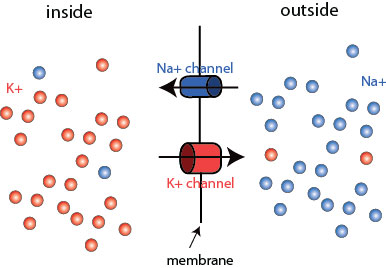 Hi nha,
Hi nha,| MadSci Network: Cell Biology |
 Hi nha,
Hi nha,
Good question. I'll provide an answer that may be confusing at first, but
with a bit of explanation, I hope will be clear.
There are channels that leak potassium (referred to as K+) in and sodium (Na+) out, but they are
the same channels that leak K+ out and Na+ in. I'll describe why below.
First, unlike pumps that are often considered unidirectional (though not always), channels have little control over whether they allow an ion (Na+ or K+) in or out. They are just holes in the membrane wall. So then the question arises: why does K+ go out and Na+ in, and not vice versa?
As you may have discussed in your class, concentration gradients of Na+ and K+ exist across the cell membrane. With the help of the pumps, the Na+ concentration (blue in the picture) is high outside the cell relative to the inside, and K+ (red) is high inside, low outside. That means that if any channel (hole) opens that can allow Na+ or K+ through, the ion will travel along its concentration gradient. That is to say, the ion (Na+) will flow from a region of high concentration (outside) to a region of low concentration (inside).
The implication of this is that if we experimentally reversed the concentration gradients, such that Na+ was high inside, and low outside, a leak channel would allow Na+ out. (Normally, the pumps would be working overtime to correct this problem, too!) In the laboratory, we sometimes use a trick like this to figure out what type of ion a channel likes to pass. If you swap the concentrations of Na+, for instance, and you see the behavior of the channel reverse, you know that channel passes Na+!
I hope this makes sense!
- Alex
Try the links in the MadSci Library for more information on Cell Biology.